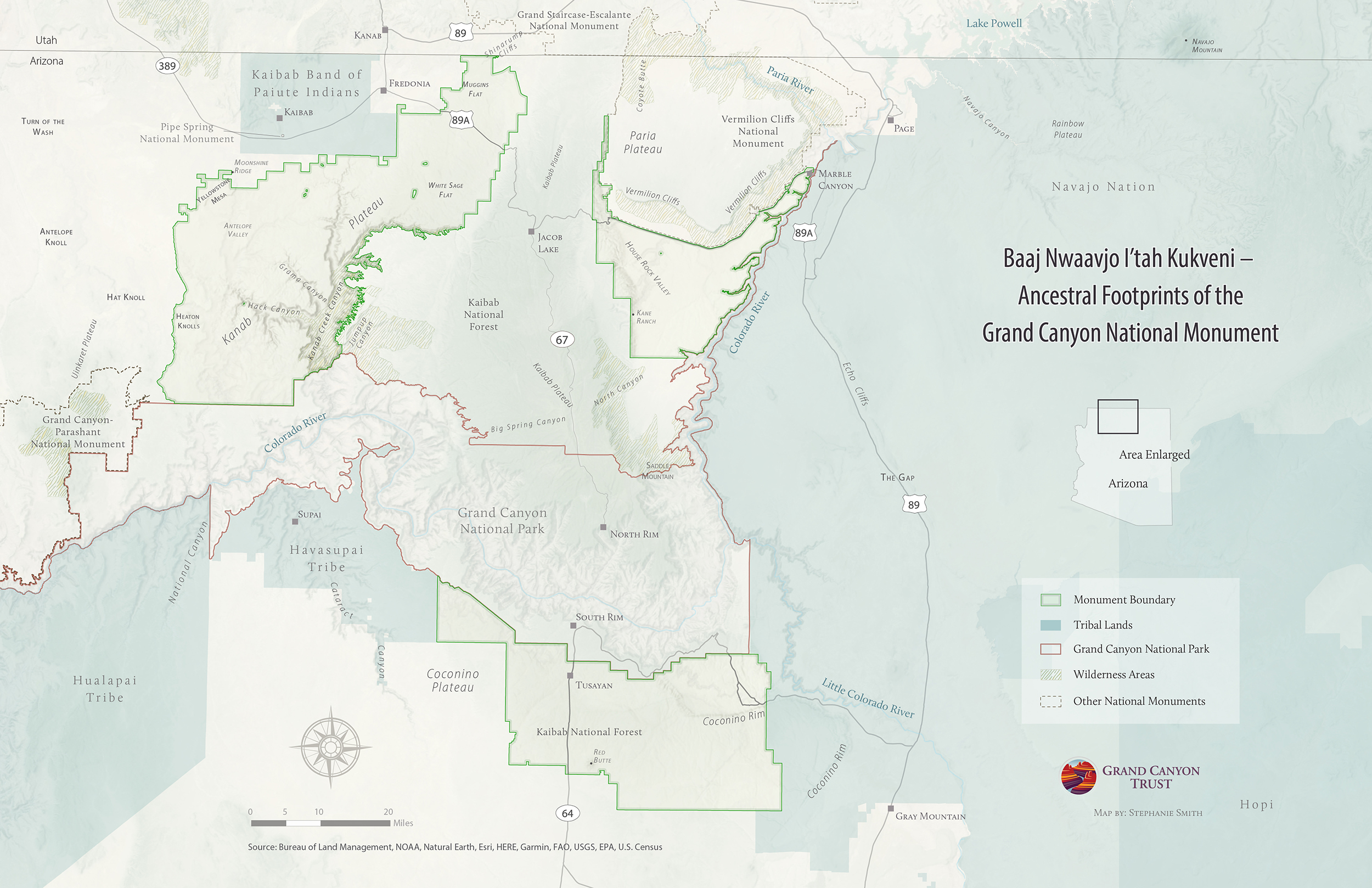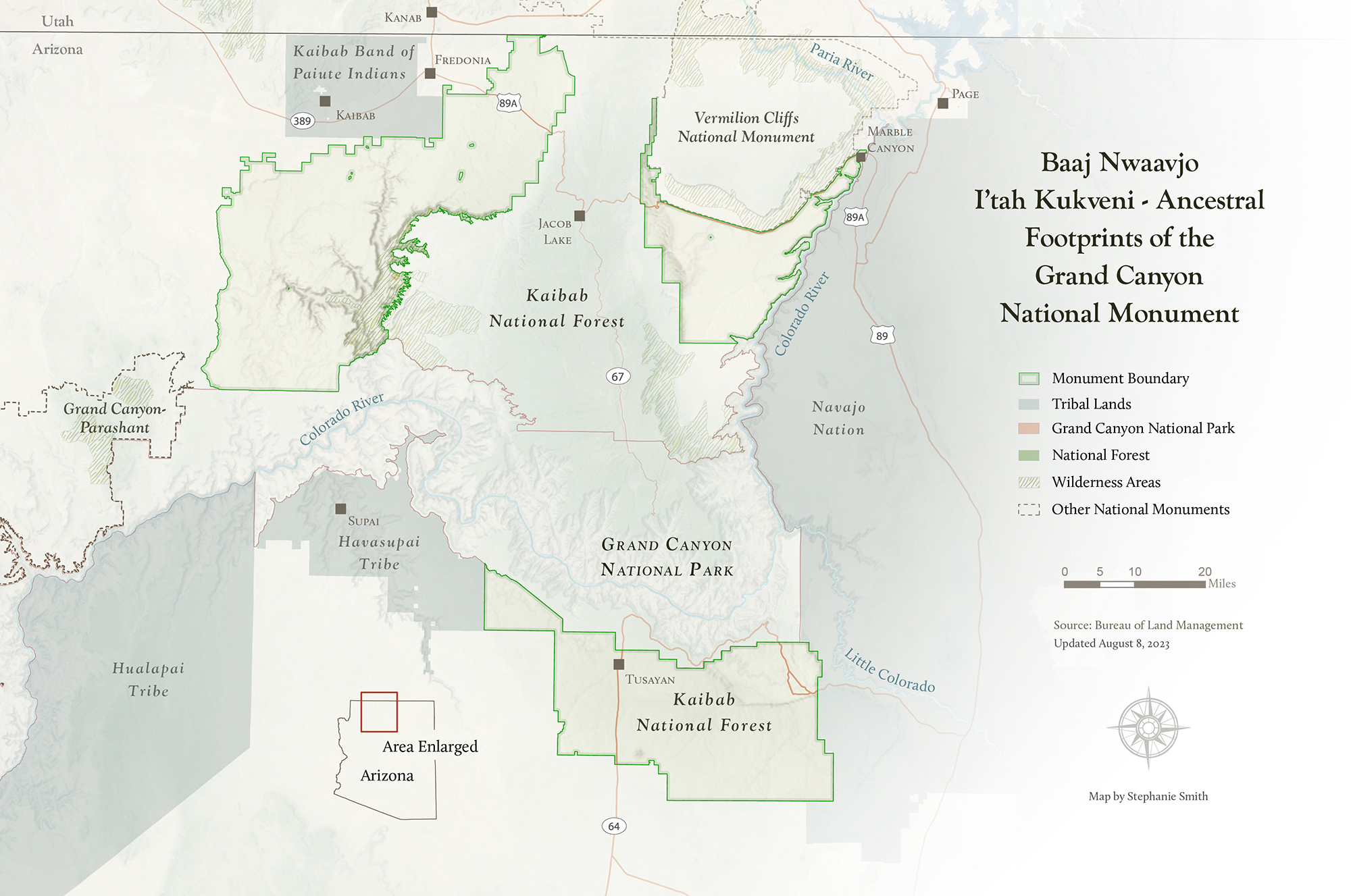FOR IMMEDIATE RELEASE
FLAGSTAFF, AZ — A new poll released January 14, 2025 shows strong bipartisan support for Baaj Nwaavjo I'tah Kukveni – Ancestral Footprints of the Grand Canyon National Monument, just outside Grand Canyon National Park, and for protecting public lands. The survey, conducted by independent polling and opinion research firm GQR, also revealed overwhelming public support for Native American co-stewardship of ancestral lands.
According to the poll, 97% of Arizona voters agree that national parks and monuments and their natural beauty are essential to Arizona, and 93% agree that public lands are essential for guaranteeing access to outdoor recreation.
"There's just no question about the strength of these numbers," said Anna Greenberg, senior partner at GQR.
SEE FOR YOURSELF
See the slide deck of the poll's key findings ›
Read an overview of the poll's key findings in a memo from the polling firm ›
88% of Arizona voters support the Antiquities Act, the law that allows presidents to designate existing public lands as national monuments. Presidents of both parties have designated national monuments using the Antiquities Act and support for presidents continuing to have this authority is strong across the political spectrum, with 82% of Republicans, 90% of Independents, and 91% of Democrats supporting it.
At the same time, public support for the recently designated Grand Canyon monument continues to grow. Fully 80% of Arizona voters support Baaj Nwaavjo I’tah Kukveni Grand Canyon national monument, including 68% of Republicans, 81% of Independents, and 91% of Democrats. That’s up from 75% of Arizona voters who supported designating the monument in 2023.
"Protecting these lands as a national monument protects precious water resources that flow into the Colorado River and wildlife habitat for many species of birds and mammals, and importantly, it ensures economic opportunities that cities and towns throughout Northern Arizona rely on," said Becky Daggett, mayor of the City of Flagstaff, a major gateway community to the monument. "Now is the time to let your representatives know what those public lands mean to you in your various locations, and how you utilize those lands," Daggett added.
Only 18% of Arizona voters oppose or somewhat oppose the Grand Canyon national monument. That means voters support Baaj Nwaavjo I’tah Kukveni national monument by a more than four-to-one margin.
"Tourism and recreation are central driving forces of the economy here in Coconino County and in our surrounding area. This monument is an asset to our economy, and it protects our lands and waters. It safeguards sacred ancestral lands for tribes that have inhabited these lands for generations, and it protects natural areas essential for recreation and tourism," said Patrice Horstman, chair of the Coconino County Board of Supervisors, District 1. "Preserving and protecting our natural lands is a bipartisan matter," said Horstman.
The poll also shows strong support for Native American co-stewardship, with 87% of Arizona voters agreeing that Native American tribes should play a central role in protecting and managing ancestral lands.
Baaj Nwaavjo I’tah Kukveni national monument was designated at the request of the Grand Canyon Tribal Coalition, a group of 13 Native American tribes with strong cultural connections to the area, in part to protect cultural and spiritual sites.
"It is a place that has sacred sites. It is a place where we go to pray, to gather, and to continue our traditions, our customs, our songs and dances. This is very important to protect this land for us," said Bernadine Jones, chairwoman of the Havasupai Tribe. "And so I am so grateful to hear that there is great support for protection of the land."
The poll also revealed how strongly Arizona voters oppose attacks on public lands, with 75% opposing any attempt to sell off public lands and 69% opposing rolling back the Antiquities Act. Only 37% think there should be more oil and gas drilling on public lands and only 18% hold a favorable view of uranium companies. At a time when Arizona voters remain deeply divided on many issues, they are united in their respect and appreciation for public lands.
"At a time when political divisions drive so much of public land policy, Baaj Nwaavjo I’tah Kukveni National Monument cuts through the fray. This monument shows that Americans can find unity in some things and we have the tireless efforts of the Grand Canyon Tribal Coalition, our governor, both senators and many members of Congress, many local elected leaders, and community members who hail from across the political spectrum in Arizona to thank for that," said Amber Reimondo, energy director at the Grand Canyon Trust.
See a gallery and download photos of the monument, free for media use ›
Background
Baaj Nwaavjo I'tah Kukveni – Ancestral Footprints of the Grand Canyon National Monument was designated on August 8, 2023 to protect just under 1 million acres of existing public lands just outside Grand Canyon National Park. The monument was designated at the request of the Grand Canyon Tribal Coalition, a group of 13 Native American tribes with strong cultural connections to the area.
ABOUT THE MONUMENT
Read the August 8, 2023 national monument proclamation ›
Read the White House fact sheet about the monument ›
Maps
Baaj Nwaavjo I'tah Kukveni – Ancestral Footprints of the Grand Canyon National Monument. The national monument spans 917, 618 acres of forests and grasslands on the north and south rims of the Grand Canyon, protecting cultural and religious sites, plants, animals, and important water sources that flow into the Colorado River. The national monument only includes federal lands and does not include any state or private lands.
Unbranded monument boundary map
Note: These maps were made based on this U.S. Bureau of Land Management map. Download the shapefile for the Baaj Nwaavjo I'tah Kukveni – Ancestral Footprints of the Grand Canyon National Monument ›


